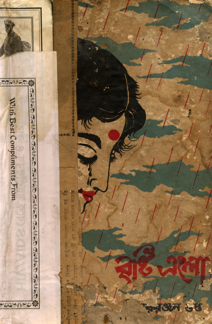Together–Apart: Fragmented Thoughts on Literature, Community and Imagination
Posted on Jun 07, 2012
Literature is ‘an afamilial . . . asocial society,’ claims Pascal Quignard, ‘The person who writes is someone who tries to . . . break the dialogue . . .. To extricate himself from brotherhood and fatherland. To undo all religious bonds.’What is the meaning of community for the writer? When a writer writes, whom does he/she write for?
Mahasweta Devi writes her novels and short stories in solidarity with the marginalized communities of India. Yet, she explained, in a film interview with her publisher Naveen Kishore of Seagull Books, how she seeks solitude and isolation from others in order to communicate her writings. By necessity, she communes with her reader while keeping them at a distance. This would confirm Quignard’s belief that ‘the artist cannot take part in the operation of the human community at the very same time as he is striving to detach himself from it.’
The actor Martin Sheen once said of his social activism (he was been arrested over 60 times) that he does not express his views in order to coerce others into following them. He simply does it for the benefit of his own sense of being. ‘You do it because you cannot not do it and be yourself.’
Nabaneeta Dev Sen has reflected upon a time when she felt ‘immensely unhappy’ if she had not written anything in a period of twenty-four hours. ‘There was an inner pressure that forced me to write. Words were important. How do I know who I am until I have written myself and read myself on a piece of paper in front of me? There I was, me, Nabaneeta, taking shape, on a piece of paper.
Literature, Quignard believes, is ‘the most de-socializing experience there ever was. The most anchoritic. So much so that its history never transited from country to country. It passed from monastery to monastery. Passed from monk to monk. Passed from monos to solus. From one lone being to another.’ And yet for him literature is also, ‘A voice so intimate that it is no longer even conveyable in the air.’ It is in fact a kind of de-socializing intimacy. ‘Between the one who writes and the solitude of the one who reads, there is much that cements the two.’
The relationship between a writer and the marketing department at a publishing house is more problematic. Sales and marketing managers, like politicians, require a pre-meditated idea of who their public is in order for them to function, but for a writer or an artist, the desire to communicate may actually take precedence over the identity of the recipient. Modern politics and society is based on a pre-conceived notion of its ‘public’. Quinard writes that ‘for the first time, the form of a society is opposed to the existence of literature. Neutrality in the way a society might be organized belongs now among the impossibilia,’ that ‘our societies . . . are frightened.’ They ‘reject the most thrilling, most desirous and finest joys, which always have in them the risk of ruin and death’. John Berger once wrote that fear was an instinct in animals and endemic in humans, that humans were unhappy apes but what separates the former from the latter is not the mind so much as perception.
A society centred on the written word ‘wrested prehistoric humanity from the world of dreams and the imagination,’ warns Quignard. ‘Pregeneric humanity was buried in its picture caves, as in its dreams.’ Society was once entrenched in the imaginary, formed of images. It has since forgotten this intimate relationship with what constitutes itself. Such relationships are precarious in any case. The imaginary also supersedes the very reality of which it is a constituent. I had one once. We connected and yet existed together–apart, or so I thought. As it turned out, what I had perceived as a meeting of minds, an intimacy of complimentary imaginaries, was merely a figment of my imagination, willed into an illusory reality. From monus to solus: so it goes.
‘Alas, the mistaken heart!’ lamented Rabindranath Tagore, in The Postmaster,
Its delusions never end, the laws of reason enter the mind after much delay, disbelieving incontestable evidence it embraces false hope with both arms and all its might to its breast; in the end one day, severing the umbilical cord and sucking the heart empty of blood, it flees, there is then a return to one’s right senses and the mind grows restless again to embrace its next delusion.

‘The decision to get away from everyone else, the choice of an outsider status emerges the moment the first family unit appears among animal groups,’ says Quignard. As early as the sixteenth century, Henry Purcell expressed the sense of ambivalence that one incurs, between a desire for one’s own freedom and the affection for other beings. ‘Oh Solitude! My sweetest choice,’
For thy sake I in love am grown
With what thy fancy does pursue;
But when I think upon my own,
I hate it for that reason too,
Because its needs must hinder me
From seeing and from serving thee.
O solitude, O how I solitude adore!
For as there are images and realities, there is art and there is life. ‘Whenever I have to choose between poetry and life,’ writes Nabaneeta Dev Sen, ‘I decide in favour of life, knowing full well that life was most treacherous. Whereas, poetry would offer, as ever, the final refuge. It will never let me down. Every time I was flooded over and drowning, poetry pulled me up onto dry land. I survived.’
Becky Ayre
Leave a comment ×